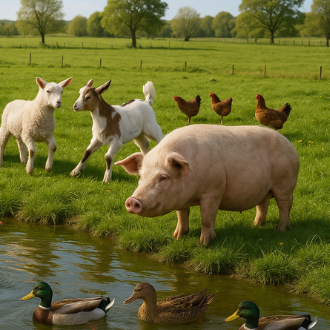The Fundamental Needs of Farm Animals: Well-being, Space, and Respectful Interactions
By Lost'Him Team • February 22, 2025

Farm animals—whether cows, goats, sheep, pigs, poultry, or rabbits—play a vital role in our rural landscapes and daily lives. To ensure their health and well-being, it is essential to meet their fundamental needs.
These needs include adequate space, respectful human interactions, and a secure, stimulating environment. Here is a comprehensive guide to providing optimal conditions for your animals to ensure their long-term well-being.
1. Adequate and Sufficient Space for Each Species
👉 Recommended space requirements:
- 🐄 Cattle: 1 hectare per 3–4 cows; shelter of 6–10 m² per adult.
- 🐑 Sheep: 1,000 to 1,500 m² for a flock of 4–5 sheep; shelter of 1.5 m² per adult.
- 🐐 Goats: 1,000 m² for 4–5 goats; shelter of 1.5–2 m² per goat, with climbing structures.
- 🐖 Pigs: 150–200 m² of land per pig; shelter of 2.5–3 m² per adult, with mud baths.
- 🐔 Poultry: Outdoor range of 15–20 m² per bird; coop space of 0.5 m² per hen.
💡 Providing enough space allows animals to express their natural behaviors—grazing, running, scratching, foraging, and socializing.
2. A Secure and Comfortable Shelter
👉 Characteristics of an optimal shelter:
- ✅ Properly sized for the species.
- ✅ Thermal insulation for protection from cold and heat.
- ✅ Effective ventilation without drafts.
- ✅ Dry and bedded flooring, with regularly refreshed litter.
- ✅ Reinforced security to prevent predators and escapes.
💡 A well-designed shelter is a haven of safety and comfort for your animals.
3. A Balanced and Appropriate Diet
👉 Essential feeding principles:
- 💧 Permanent access to clean, fresh water.
- 🌿 High-quality forage: grass and hay for herbivores.
- 🌾 Grains and pellets for poultry and pigs.
- 🧂 Mineral supplements (salt, trace elements) to balance the diet.
- 🥚 Calcium supplements for laying hens.
💡 A well-balanced diet ensures healthy growth and stronger disease resistance.
4. Constant Access to Water
👉 The vital importance of water:
- 💦 Clean and refilled drinking troughs daily.
- 🌡️ Winter precautions to prevent freezing.
- 🚰 Sufficient watering points to avoid competition.
💡 A well-hydrated animal is healthier and more resilient to stress.
5. Environmental Stimulation and Natural Activities
👉 Ways to enrich the environment:
- 🌿 Diverse pastures to vary food sources.
- 💦 Mud baths for pigs.
- 🌳 Trees and natural shelters for shade and exploration.
- 🐦 Perches and dust baths for poultry.
- 🎾 Toys and obstacles like balls, digging bins, logs.
💡 An enriched environment reduces boredom and aggressive behaviors.
6. Respectful and Reassuring Human Interactions
👉 Building a relationship of trust:
- 🤲 Approach gently and calmly.
- 🗣️ Speak in a soft voice.
- 🥕 Associate interactions with positive experiences (treats, petting).
- 📏 Respect their personal space.
💡 Respectful interactions reduce stress and strengthen trust.
7. Regular Veterinary Care and Disease Prevention
👉 Key health monitoring points:
- 💉 Appropriate vaccinations.
- 💊 Routine deworming.
- 🩺 Monitoring weight, coat condition, eyes, and hooves.
- 🧼 Cleaning and disinfecting shelters and pastures.
💡 Prevention is more effective and less costly than treatment.
8. Common Mistakes to Avoid
- ❌ Lack of space → stress and disease.
- ❌ No trees or shelters → risk of heatstroke.
- ❌ Inappropriate diet → deficiencies or obesity.
- ❌ Lack of stimulation → stereotypic behaviors.
- ❌ Rough handling → stress and defensive reactions.
💡 Observing and understanding your animals helps prevent these mistakes.
Conclusion: Well-being and Respect, the Keys to a Thriving Farm
- ✅ Adequate and spacious living conditions.
- ✅ Secure shelters against weather and predators.
- ✅ A balanced and diverse diet.
- ✅ Constant access to clean water.
- ✅ Stimulating activities for mental and physical well-being.
- ✅ Positive human interactions.
- ✅ Regular veterinary monitoring.
💡 By fulfilling these fundamental needs, you ensure a healthy, balanced, and happy life for your farm animals. 🌻🐑🐖🐓💚
 EN
EN  FR
FR